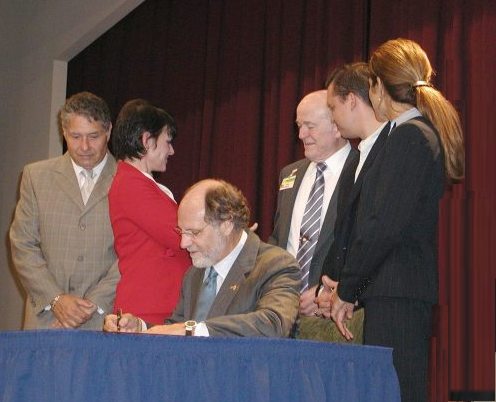On October 22, 2007, NJ Governor Corzine signed a bill that required CCRCs to include at least one resident of the community as a full board member on its governing board. This measure had been four years in gestation, and the event was a signal victory for ORANJ, which had sponsored this measure against considerable odds. The bill became an amendment to Section 16 of P.L.1986, c.103 (C.52:27D-345)
Background
Ten years of effort had failed to convince CCRC managers to voluntarily include at least one resident on their governing boards. In August 2003, at a meeting of presidents of ORANJ communities to discuss priorities and set strategies for the organization, the ORANJ legislative committee proposed the bill. After much discussion the motion was approved unanimously. The NJ bill followed the pioneering work of Michigan, Missouri, California, Maryland, and the District of Columbia, which had already enacted legislation mandating resident board membership.
The ORANJ Quartet and residents of New Jersey CCRCs achieved legislative change without the use of paid lobbyists.
The Legislative Committee set to work. Most of the responsibility devolved on four leaders who came together as the ORANJ Quartet. The lead presenter was Charles Germany, an ordained minister and former President of ORANJ, David Hibberson, a former Engineering Manager, was a Vice President of ORANJ and Chair of the Legislative Committee, Gary Baldwin, a former corporate officer, was President of ORANJ, and Wink Livengood was another ORANJ Vice President.
The four leaders spent many hours planning, drafting, and making countless trips to meet with legislative committee chairs and key members of the NJ Assembly and Senate. At the request of the ORANJ Legislative Committee, many letters were written by residents to legislators, asking for their support. Many CCRC residents traveled to Trenton to attend the hearings and demonstrated that this was an important issue for which they wanted their representatives’ vote. These efforts spanned a number of years, leading to success in 2007.
On April 7, 2006, ORANJ Legislative Action and Advocacy Committee members met with Senator Ellen Karcher, District 12, Freehold, to encourage her support of
- the new Senate Bill S425, requiring inclusion of a resident as a member of a CCRC’s governing body and the inclusion of residents in discussions of critical matters to be decided by the governing body
- re-activating the Continuing Care Advisory Council, a 17-member council to advise and provide information to the Commissioner of Community Affairs on matters concerning CCRCs
- the re-introduced Senate Bill S420, Veteran’s Property Tax Deduction, for residents in CCRCs
On May 11, 2006, Charles Germany, immediate past president of ORANJ, testified before Assemblywoman Pou’s committee on Assembly Bill A3018, (now A1148) in support of Senate Resolution 27, urging the reactivation of and making appointments to the Continuing Care Advisory Council.
On June 11, 2007, Seniors’ Right Bill, S425/A3989 passed:
- Residents’ right to free self-organization.
- Quarterly meetings between Board of Directors (or their designated representative who shall not be the CEO or staff member of the CCRC) and residents (or their elected representatives) to discuss subjects that may include income, expenditures and financial matters as they apply to the facility and proposed changes in policies, programs and services.
- Inclusion by the Board of Trustees or other local governing body of the facility of at least one resident as a full voting member of that body. Resident members shall be nominated by the elected representatives of residents and selected by the Board of Trustees or other local governing body.
- Consultation and discussion by the Board with representatives of residents of any proposed action that might significantly affect the well being of the residents or the financial stability of the facility BEFORE taking any such action.
On October 22, 2007 Governor Corzine signed S425/A3989 into law at Seabrook Village, a CCRC in Tinton Falls. The ceremony was brief and moving and achieved its purpose: with the stroke of a pen, several to be exact, the Governor created a new law that mandated that at least one resident be included on the governing board of each CCRC.
The text of the law is on the New Jersey legislature site in HTML -or- PDF format.
In signing the bill, now known as P.L. 2007, c.192, the Governor said, “The idea that one ought to be consulted and have a vote in the world that you’ve made a commitment to, seems like… simple common sense. People ought to have a voice.” The Governor was accompanied by the bill’s main supporters in the legislature, Senators Karcher and Singer and Assembly persons, Panter and Beck. All spoke and Senator Karcher made the moving comment, “How we take care of our young and our seniors tells us what kind of a society we have.” And she added that this bill shows that democratic rights should not disappear when we grow older. Several commended the Governor for signing the bill in the face of strong opposition.
Over 100 residents from about 13 CCRCs around the state attended to celebrate the signing. Gary Baldwin, President of ORANJ, spoke for the residents. He said, “This is a great day for us, for citizens around the state.” He thanked in particular Senators Karcher and Singer in bringing about this legislation and commented that the long battle showed that the system allows for a small group of ordinary people to win in the legislative process. Now that the legislation has been signed, NJ can take its place besides Michigan, Missouri, Ohio, California, Maryland, and the District of Columbia who already have similar bills on the books.

